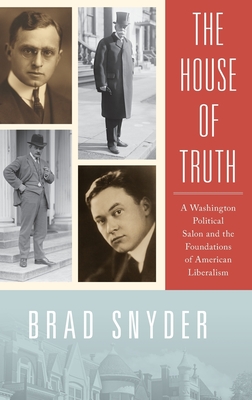The House of Truth: A Washington Political Salon and the Foundations of American Liberalism

The House of Truth: A Washington Political Salon and the Foundations of American Liberalism
In 1912, a group of ambitious young men, including future Supreme Court justice Felix Frankfurter and future journalistic giant Walter Lippmann, became disillusioned by the sluggish progress of change in the Taft Administration. The individuals started to band together informally, joined initially by their enthusiasm for Theodore Roosevelt's Bull Moose campaign. They self-mockingly called the 19th Street row house in which they congregated the "House of Truth," playing off the lively dinner discussions with frequent guest (and neighbor) Oliver Wendell Holmes, Jr. about life's verities. Lippmann and Frankfurter were house-mates, and their frequent guests included not merely Holmes but Louis Brandeis, Herbert Hoover, Herbert Croly - founder of the New Republic - and the sculptor (and sometime Klansman) Gutzon Borglum, later the creator of the Mount Rushmore monument. Weaving together the stories and trajectories of these varied, fascinating, combative, and sometimes contradictory figures, Brad Snyder shows how their thinking about government and policy shifted from a firm belief in progressivism - the belief that the government should protect its workers and regulate monopolies - into what we call liberalism - the belief that government can improve citizens' lives without abridging their civil liberties and, eventually, civil rights. Holmes replaced Roosevelt in their affections and aspirations. His famous dissents from 1919 onward showed how the Due Process clause could protect not just business but equality under the law, revealing how a generally conservative and reactionary Supreme Court might embrace, even initiate, political and social reform. Across the years, from 1912 until the start of the New Deal in 1933, the remarkable group of individuals associated with the House of Truth debated the future of America. They fought over Sacco and Vanzetti's innocence; the dangers of Communism; the role the United States should play the world after World War One; and thought dynamically about things like about minimum wage, child-welfare laws, banking insurance, and Social Security, notions they not only envisioned but worked to enact. American liberalism has no single source, but one was without question a row house in Dupont Circle and the lives that intertwined there at a crucial moment in the country's history.
PRP: 254.14 Lei
Acesta este Prețul Recomandat de Producător. Prețul de vânzare al produsului este afișat mai jos.
203.31Lei
203.31Lei
254.14 LeiLivrare in 2-4 saptamani
Descrierea produsului
In 1912, a group of ambitious young men, including future Supreme Court justice Felix Frankfurter and future journalistic giant Walter Lippmann, became disillusioned by the sluggish progress of change in the Taft Administration. The individuals started to band together informally, joined initially by their enthusiasm for Theodore Roosevelt's Bull Moose campaign. They self-mockingly called the 19th Street row house in which they congregated the "House of Truth," playing off the lively dinner discussions with frequent guest (and neighbor) Oliver Wendell Holmes, Jr. about life's verities. Lippmann and Frankfurter were house-mates, and their frequent guests included not merely Holmes but Louis Brandeis, Herbert Hoover, Herbert Croly - founder of the New Republic - and the sculptor (and sometime Klansman) Gutzon Borglum, later the creator of the Mount Rushmore monument. Weaving together the stories and trajectories of these varied, fascinating, combative, and sometimes contradictory figures, Brad Snyder shows how their thinking about government and policy shifted from a firm belief in progressivism - the belief that the government should protect its workers and regulate monopolies - into what we call liberalism - the belief that government can improve citizens' lives without abridging their civil liberties and, eventually, civil rights. Holmes replaced Roosevelt in their affections and aspirations. His famous dissents from 1919 onward showed how the Due Process clause could protect not just business but equality under the law, revealing how a generally conservative and reactionary Supreme Court might embrace, even initiate, political and social reform. Across the years, from 1912 until the start of the New Deal in 1933, the remarkable group of individuals associated with the House of Truth debated the future of America. They fought over Sacco and Vanzetti's innocence; the dangers of Communism; the role the United States should play the world after World War One; and thought dynamically about things like about minimum wage, child-welfare laws, banking insurance, and Social Security, notions they not only envisioned but worked to enact. American liberalism has no single source, but one was without question a row house in Dupont Circle and the lives that intertwined there at a crucial moment in the country's history.
Detaliile produsului









